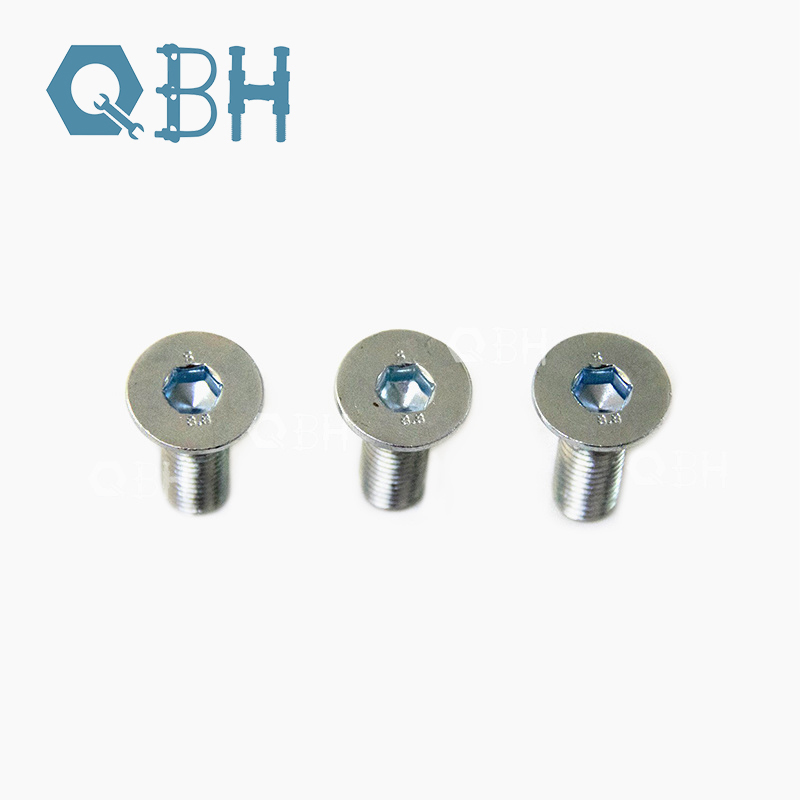What Are Socket Bolts ?
2025-09-01
When it comes to mechanical assemblies, automotive engineering, construction, and precision machinery, socket bolts play a crucial role. They are widely used in situations where high-strength fastening, compact design, and precise torque control are required.
What Are Socket Bolts and Why They Matter
Socket bolts—also known as socket head cap screws—are fasteners characterized by a cylindrical head and a recessed hexagonal drive hole. Instead of using a traditional external hex head, these bolts require an Allen wrench or hex key for installation, making them ideal for applications where space is limited or a flush finish is required.
Key Advantages of Socket Bolts
-
Compact Design – The small cylindrical head saves space and allows installation in tight spots.
-
High Strength – Typically made from alloy steel, stainless steel, or titanium, socket bolts offer superior tensile strength compared to standard bolts.
-
Precise Torque Control – The internal hex drive allows accurate tightening without damaging the head.
-
Versatile Applications – Used in automotive engines, industrial machinery, construction projects, electronics, and aerospace engineering.
Common Types of Socket Bolts
| Type | Head Shape | Drive Type | Applications |
|---|---|---|---|
| Socket Head Cap Screw | Cylindrical head | Hex drive | Automotive, machinery, robotics |
| Button Head Socket Bolt | Low-profile rounded head | Hex drive | Furniture, electronics, lightweight applications |
| Flat Head Socket Bolt | Countersunk head | Hex drive | Flush surface assembly, aerospace |
| Shoulder Socket Bolt | Smooth cylindrical shoulder | Hex drive | Precision machinery, rotating parts |
| Socket Set Screw | No head, recessed drive | Hex drive | Securing components, shafts, collars |
Material Options
-
Alloy Steel – High tensile strength, suitable for heavy-duty applications.
-
Stainless Steel (304/316) – Excellent corrosion resistance, ideal for marine and outdoor use.
-
Titanium – Lightweight, strong, and resistant to extreme environments.
-
Brass – Provides aesthetic appeal and corrosion resistance for decorative installations.
How to Choose the Right Socket Bolt for Your Needs
Choosing the correct socket bolt requires understanding your project’s requirements. The wrong bolt can compromise safety, structural integrity, or performance. Here are the key factors to consider:
a) Determine the Required Strength
-
Check tensile strength and hardness rating.
-
Heavy machinery and automotive parts typically require high-grade alloy steel.
-
For lightweight assemblies, stainless or titanium bolts may suffice.
b) Choose the Right Size and Thread Type
Socket bolts come in metric and imperial (inch-based) standards. Always verify:
-
Bolt diameter (e.g., M6, M8, ¼-inch)
-
Thread pitch (fine vs. coarse threads)
-
Length required for your assembly
c) Consider Environmental Conditions
-
Outdoor installations → Prefer 316 stainless steel for superior corrosion resistance.
-
High-temperature environments → Choose titanium or high-grade alloy steel.
-
Marine applications → Stainless steel or coated socket bolts are recommended.
d) Evaluate Head Style and Accessibility
-
For tight spaces → Socket head cap screws are ideal.
-
For flush surfaces → Flat head socket bolts ensure a smooth finish.
-
For aesthetic purposes → Button head bolts offer a sleek design.
Product Specifications and Technical Parameters
Below is a detailed overview of the technical specifications we offer for premium socket bolts:
| Parameter | Specification |
|---|---|
| Material | Alloy Steel, Stainless Steel (304/316), Titanium, Brass |
| Head Types | Socket Cap, Button, Flat, Shoulder, Set Screws |
| Drive Type | Internal Hex, Torx (optional) |
| Diameter Range | M3 to M30 / 1/8” to 1-1/4” |
| Length Range | 6 mm to 200 mm / 1/4” to 8” |
| Thread Standards | Metric (DIN 912, DIN 7991), Imperial (ANSI/ASME) |
| Surface Finishes | Zinc Plated, Black Oxide, Passivation, Hot-Dip Galvanized |
| Strength Grades | 8.8, 10.9, 12.9 (ISO/DIN standards) |
| Corrosion Resistance | Up to 2,000 hours salt spray (coated bolts) |
| Applications | Automotive, Aerospace, Machinery, Electronics, Construction |
These specifications ensure that every bolt meets ISO, DIN, ANSI, and ASTM standards, providing consistent quality for industrial and commercial use.
Applications, FAQs, and Where to Get High-Quality Socket Bolts
Socket bolts are integral across multiple industries due to their reliability and precision.
a) Industry Applications
-
Automotive → Engine assembly, transmission housing, braking systems
-
Aerospace → Aircraft structures, turbine housings, cockpit assemblies
-
Construction → Steel frameworks, architectural installations, heavy-duty connections
-
Electronics → Mounting printed circuit boards, compact device enclosures
-
Industrial Machinery → Robotics, conveyor systems, machine tools
b) Socket Bolt FAQs
Q1: What is the difference between a socket bolt and a regular hex bolt?
A1: A socket bolt uses an internal hex drive, while a hex bolt has an external hex head. Socket bolts are preferred in applications with limited space or where a flush finish is needed. They also provide higher torque control and often come in higher strength grades.
Q2: How do I prevent socket bolts from loosening over time?
A2: You can use thread-locking compounds like Loctite, spring washers, or nylon-insert lock nuts to enhance vibration resistance. In high-stress environments, choose pre-coated bolts or bolts designed with locking features to ensure long-term stability.
c) Why Choose QBH for Socket Bolts
For businesses and engineers seeking high-quality socket bolts, QBH delivers products manufactured to the highest international standards. With advanced production facilities and strict quality control, QBH ensures every bolt meets ISO 9001 certification and global compliance standards.
-
Premium Materials → Only certified alloy steel, stainless steel, and titanium
-
Comprehensive Product Range → Full metric and imperial sizes available
-
Strict Quality Testing → Tensile tests, hardness checks, and corrosion resistance evaluations
-
Custom Solutions → Tailored manufacturing for specialized industrial requirements
If you’re looking for reliable socket bolts for your next project, QBH provides the perfect balance of strength, precision, and durability.
Contact us to discuss your requirements and get a competitive quote for bulk or customized socket bolt solutions.





